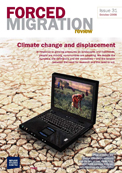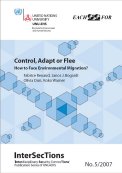The European Science Foundation is hosting
a conference on “Environmental Degradation and Conflict: From Vulnerabilities to Capabilities,” December 5-9, 2010 in Bielefeld, Germany. The conference aims to shed light on the complex dynamics of environmentally induced migration and the associated societal processes. Toward this end, they seek to further the interdisciplinary debate and exchange of knowledge from the fields of migration, climate change, disaster, development, and others. Connecting vulnerability, capability and transnational approaches will help to link existing research and open new research venues for the future. The conference is structured along seven issue areas.
(1) Analyzing the debate on “climate refugees” and its shortcomings from the point of view of migration studies. The central question is: What are the contentious issues of the environment migration debate? In particular, the question needs to be addressed how migratory strategies are embedded within the broader livelihood context, and beyond climate change.
(2) Reflecting the vulnerability context in accordance with the sustainable livelihood approach from the natural science perspective. The central question is: What do we know about climate and environmental change in developing and developed regions of the world? Contributions should seek to make climate change projections, including the uncertainties of climate change modulation, accessible to participants from the social sciences.
(3) Reflecting the vulnerability context in light of the sustainable livelihood approach from a social scientific perspective. The guiding question is: What impact do climate and environmental change have on the livelihoods of vulnerable groups? The discussions focus on the basic categories of areas and persons which have been identified as highly affected by climate change. The categories include fields crucial for livelihood such as food and water systems, basic services such as health and housing systems, and income generation.
(4) Presenting results from field research on the relationship between vulnerabilities and capabilities. The guiding question is: What do field research and case studies tell us about vulnerabilities and capabilities with regard to mobility? We interpret mobility
as a potential asset that might have been consciously chosen to mitigate the effects of environmental change. As vulnerabilities and capabilities do not depend only on environmental change, contributions should consider structures of inequality and how relevant institutions, policies, and processes feed into constraints and opportunities for mobility.
(5) Deliberating upon approaches that promise to incorporate the capabilities perspective more deeply into applied methodologies. The leading question is: How can we support and benefit from the capabilities perspective in our research on environmentally induced migration? Contributions should aim to establish a basis from which the academic community can begin to develop an elaborated approach to the questions at stake.
(6) Presenting results from field research that focuses on those who could be called environmental refugees in a more narrow sense. These are the victims of sudden and extreme weather events, whose plight raises the question whether and to which extent a capabilities approach can be applied to their situation as well. Central question for contributions is: How does the mobility perspective apply to the humanitarian crisis caused by climate and environmental change?
(7) Analyzing the political dimension of the acquired findings and insights. At the centre are questions about the role and function of (social) sciences and (social) scientists in public debates and for policy-making. Conference participants are invited to analyze policy approaches, and to examine how a more sophisticated exploration of environmentally induced migration would feed back into those approaches.
Conference format:
- lectures by invited high level speakers
- short talks by young & early stage researchers
- poster sessions, round table and open discussion periods
- forward look panel discussion about future developments
List of confirmed speakers:
- Tamer Afifi – Institute for Environment and Human Security, DE
- Stefan Alscher – Universidad Autónoma Chapingo, MX
- Richard Black – Sussex Centre for Migration Research, UK
- Philippe Boncour – International Organization of Migration, CH
- Volker Böge – The University of Queensland, AU
- Alexander Carius – Adelphi Research/Adelphi Consult, DE
- Anne Dölemeyer – University of Leipzig, DE
- Han Entzinger – The European Research Centre on Migration and Ethnic Relations, NL
- François Gemenne – Institut du Développement Durable et des Relations Internationales, FR
- Daniela Jacob –Max Planck Institute for Meteorology, DE
- Jill Jäger – Sustainable Europe Research Institute, AT
- Dominic Kniveton – Sussex Centre for Migration Research, UK
- Gordon McGranahan – International Institute for Environment and Development, UK
- Robert McLeman – University Ottawa, CA
- Ludger Pries – University Bochum, DE
- ImmeScholz – German Development Institute, DE
- Cecilia Tacoli – International Institute for Environment and Development, UK
To learn more about the conference, please download here the call for papers.



